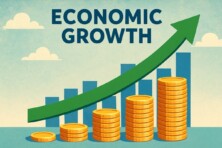According to the results of the third quarter of this year, a decrease in the volume of production activity was recorded in Germany.

According to the information released by the German Federal Statistical Office (Destatis) on Monday, October 30, in the period from July to September 2023, the gross domestic product showed a decline dynamic recorded at 0.1%. This result indicates a deterioration in the situation compared to the previous quarter when the mentioned indicator increased by 0.1%.
Experts say that the negative trend recorded in the third quarter indicates the risk of recession in Europe’s largest economy.
Destatis claims that the reason for the result for the period from July to September is a drop in the level of consumer spending. At the same time, this organization notes that companies’ investments in machinery and equipment have made a positive contribution to GDP.
Experts say that the results of the German economy for the third quarter are a negative signal for the entire European area. This is a reasonable opinion since the country is the largest economy in this region.
Claus Vistesen, chief eurozone economist at Pantheon Macroeconomics, says Berlin is once again on the verge of a technical recession, which is defined as two consecutive quarters of declining output.
Preliminary forecasts of experts contained assumptions about a decrease in GDP by 0.2%. The real result turned out to be better, but this does not negate its negative nature.
Experts say that Germany is currently struggling to recover from the energy downturn last winter, which was followed by two-quarters of stagnation. This is the only major economy in the world in which the International Monetary Fund records a reduction this year. Currently, Germany’s prospects in this sphere are an urgent problem.
Economist Martin Ademmer says that the German economic system currently exists in a mode of gradual weakening due to such negative factors as high interest rates, rising energy costs, and a decrease in external demand. He also noted that there are early signs that economic activity may stabilize by the end of 2023. According to him, the risks for the prospects remain shifted downward.
High-interest rates in Germany and around the world are a factor of pressure on demand for industrial goods, on which this country significantly depends on the issue of stimulating economic growth. Chemical giant Lanxess AG in October announced its intention to cut 7% of its workforce. Volkswagen AG plans to double the savings to increase profitability.
At the same time, in the German sphere of services, the situation is more positive, but also not characterized as favorable. The results of business surveys conducted by S&P Global indicate that the growth rates in this area also show a slowdown. Problems in the labor market are also being fixed.
S&P Global data indicate that overall private sector activity in Germany continued to decline at the beginning of the fourth quarter of 2023.
Some experts say that the slowdown in inflation and wage growth will contribute to the revival of consumer demand. At the same time, the Bundesbank report contains a forecast of the upcoming growth in household spending.
Analysts believe that the German economy will show growth of 0.5% next year.
The situation with the dynamics of GDP in Europe is heterogeneous. Spain and Belgium maintained economic growth in the third quarter. At the same time, a recession began in Australia amid a sharp drop in the level of consumption and a reduction in investment volumes.
There is also a slowdown in the growth of economic confidence in Europe. This trend has been observed for the sixth month in a row.
The results of the German economy over the past quarter have led to increased concerns about its potential. Currently, Berlin is facing problems such as an aging workforce, a high level of dependence on China, and the need for an intensive transition to new energy sources.
Senior officials, including Bundesbank President Joachim Nagel, said that one should not be too pessimistic about the country’s economic prospects, paying attention to its ability to adapt. The Minister of Economy of this state, Robert Habeck, last week called for decisions to protect Germany as a place for business.
As we have reported earlier, Сhipmaker TSMC Сommittes $3.8 Billion to Factory in Germany/









